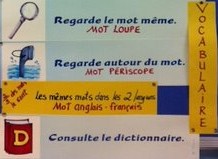I recently had the opportunity to hear Lorraine Boisclair, French teacher at the Hebrew Foundation School in Dollard-des-Ormeaux, speak about teaching her grade 5 students.
She offered insight as to how it was important to keep the kids moving during the day. That can mean different things. She may ask them to demonstrate the different angles being learned by standing and rotating or by manipulating objects to different degrees. She also has them move their desks around to get into groups. It’s all good, just as long as they get chances to move around and to break the ‘monotony’ of the day. She shared her reason for having the kids work in groups of two: It ensures that both group members remain active and in order to maximize retention of concepts learned, she has the kids re-explaining these concepts to one another.
While she explained many of her valuable teaching methods, what I want to share with you through this post is some information that I think will be helpful in demystifying French vocabulary for both you and your child.
 Ms. Boisclair addressed the issue of what to do when your child asks you what a (french) word means. Personally, I’m not willing to just give them the answer, I want them to learn how to ‘dig it up’ themselves, and so I send them to the dictionary. She recommends a few steps prior to doing this:
Ms. Boisclair addressed the issue of what to do when your child asks you what a (french) word means. Personally, I’m not willing to just give them the answer, I want them to learn how to ‘dig it up’ themselves, and so I send them to the dictionary. She recommends a few steps prior to doing this:
Step 1: Take out your “Magnifying Glass” (proverbial or actual) and LOOK at the word. Are their smaller words within the word that you recognize? Do these provide any clues as to the word’s meaning? (I have done this with my kids when we’ve been in locations without a dictionary, (like in the car), but it actually makes sense to take this step all the time)
Step 2: Take out your “Periscope” (likely proverbial) and look AROUND the word. Does the sentence / context within which the word is used provide any clue as to the word’s meaning?
Step 3: Verify if the word is what she calls an ENGLISH-FRENCH WORD. Often by looking at, or vocalizing a French word, you will recognize a similar English word. Actually, this will happen more frequently than you think. Did you know that 2/3 of French words have English roots/origins? I was blown away by this fact. She started to rattle off example after example of such words.
She further explained that after these 3 steps, most kids (and parents) will have uncovered the word’s meaning. If not, then that’s the time to pull out the dictionary.
Given that it’s back-to-school, and back-to-homework, I hope that you will find this post both timely and useful.
What tips and tricks do you employ when ‘helping’ kids with their studies and homework? Please share!
Wishing you a wonderful long weekend,
Tanya

2 Comments
Hi t. The English French thing is chicken egg; you make it seem egg chicken! The French (Breton) took over England, hence the British… as opposed to scots, Irish, welch, etc.
As I understand it, the English language took into itself words from many other languages, so while 2/3 of French words have an English twin, maybe 1/4 of English words have a French mirror… The explains why the language that has the largest vocabulary, both in use and in total is English!! Cool huh? But don’t take my word for it, do your own research!!
Have a great weekend!!
Thank you Howard for that clarification! Super-interesting. For now I will take your word for it, but perhaps I will conduct a little research 😉 Have a great weekend!